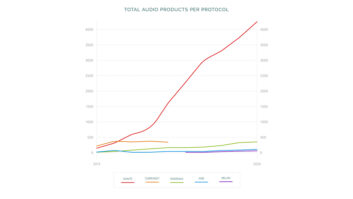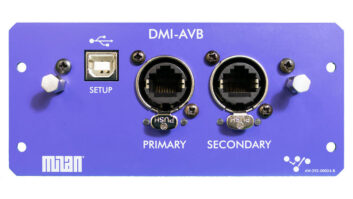Faaantastic!Life offers few guarantees, and we should be thankful for the ones we get. The sun will always rise in the east, E will likely always equal MC2, and when you ask Milan Bogdan how he’s doing, he will invariably reply, “Faaan-tastic!” like a boisterous drummer tagging a big blues shuffle. With a career and life that have twisted through as many curves and potholes as Bogdan’s, the refrain is a testament to happy perseverance, and it is a nice way to start a day.
Bogdan has been most closely associated with Nashville, where he was once a partner in Masterfonics and is now the general manager of Emerald Recording. But he covered a lot of real estate in getting there. Born in 1941 in Detroit, Bogdan found an early calling in both music and technology. He was taking electronics courses at Lawrence Tech and playing guitar in local bands when, during a session on a Del Shannon record at GM Studios in 1965, the studio encountered a problem with the tape machine. Bogdan piped up that he could fix it, which was credential enough for the studio owner, who promptly gave him the job of chief technician. Within a few years, Bogdan was engineering R&B sessions as well as playing on them, first at GM and then at Tera-Shirma Studios.
He kept playing guitar, too, and it was his engineering work with a band called The Counts that led him to Atlanta, where the record label, General Records Corp., owned a studio, the Sound Pit. “I fell in love with that city after all those years in Detroit and that’s where I wanted to live,” he says. So he and his wife, Betty, whom he’d married when she graduated high school in 1964, packed up their bags and moved their growing family south.
Bogdan soon became chief engineer at Sound Pit, and it was in Atlanta that he met many of the players who would set his course for Nashville some years later. Those included future Giant Records head and producer James Stroud, then playing drums on R&B records, and producer/ engineer Ed Seay. Bogdan cut records in Atlanta for Marvin Gaye, Alicia Bridges (he mixed her hit “I Love the Nightlife”) and others, and would occasionally make forays to Wishbone Studios in Muscle Shoals, Ala. There he ran into an artist management company whose clients included Sonny & Cher and an unknown named Harry Wayne Casey, who would become KC of KC & the Sunshine Band. Bogdan engineered their records in Miami, along with Rick Finch.
“KC was working at a one-stop [record wholesaler] in Miami at the time, and he and I used to walk around the warehouse while he was taking orders and talk about what kinds of sounds we wanted to get and which microphones to use,” Bogdan recalls. “Those were great years; everyone was having a lot of fun with the music, and even the business of it was pretty easy to deal with.”
But even when business turned sour, it remained interesting. KC & the Sunshine Band became embroiled in litigation with their label, TK Records, delaying their debut on CBS Records and forcing them to play most of their concerts outside the U.S. This was of interest to some of Bogdan’s former classmates from technical college, who were now working for the CIA; they asked Bogdan if he’d lend some of his technical expertise to a few aerial surveillance projects in Southeast Asia while the bands he worked with were on tour. “Bands carry tons of technical gear when they’re on tour, so no one questioned why I had gyroscopes,” Bogdan deadpans.
Bogdan is understandably circumspect about the details of that period of his life. But his accomplishments in Nashville are more of an open book. His connection to the city goes back to the late 1970s; he would go there to use the studios and work occasionally with Masterfonics founder Mack Evans, installing the facility’s first Neumann disk-cutting system. He took a job as a record producer with MDJ Records, which died owing him money. He then took a position as sales manager for console manufacturer Soundtracs, but when the company wanted him to relocate to Dallas, he decided to stick with Nashville, taking the job of chief engineer at Masterfonics, which was then owned by mastering engineer Glenn Meadows.
“It was a great time to be in Nashville because you could see how country music was getting ready to make a big run for it again,” he says. “There was new technology coming out-we built the first 20-Hertz room at Masterfonics, then we rebuilt both mastering suites. It looked like it was going to be great.”
Bogdan had become a partner in Masterfonics, but by the early 1990s, personal and business differences between him and Meadows led to an acrimonious split. In 1993, Bogdan left Masterfonics to become general manager at Emerald, whose owner, Dale Moore, had chosen not to participate in the spiraling technology race that was sweeping Nashville. If Bodgan is remembered for nothing else, it will be for keeping Emerald in the game without getting sucked into that financial whirlwind of large new rooms and technology upgrades.
“In 1994, we took an extra 32-track deck with a Mackie mixer and made one of the first low-cost B studios attached to a major facility in town, something that a lot of studios are doing now to keep revenues coming in,” he explains. Moore, who then owned several radio stations in the Western U.S., had done some broadcast work from Emerald in the past, offering another opportunity. “We resurrected that equipment and put together a broadcast division, which offered promotional services for artists and their record labels, using satellite networks and ISDN lines,” Bogdan adds. “We were coming up with ways to keep revenues up without putting in major new capital investments in consoles and things like that. Sometimes it was hard to watch other studios getting the latest toys, and we had to make do the best we could.”
In the middle of all this, in 1995, Betty Bogdan died of cancer, which devastated Bogdan emotionally. But his work served as a kind of therapy for him. It also gave him a perspective on the changes in town. “Nashville was definitely overbuilt,” he states. “As the music sales declined, we got into rate wars and we lost a few facilities, and I think we’ll lose a few more before it all settles out. But I wasn’t one of the ones who pushed to invest more money in it. If you know the history of country music, you know it goes in cycles, and cycles have to end. And the economy was doing good, so people had more money to spend on other things. Music historically seems to do better when the economy isn’t so healthy, when a $15 CD looks like a good entertainment bargain. And the Internet was providing another alternative for entertainment. All those things told me that building a lot of big studios wasn’t such a great idea.”
When Moore sold his radio interests and came back to Nashville full time, he embarked on a series of acquisitions, buying up several properties-most notably the faltering Masterfonics-during 1999. Bogdan was moved into a sales position, far from the technical and managerial pursuits that most engage him.In November of last year, he gave notice at Emerald and has been in discussions with a number of other facilities in Nashville and elsewhere. Like a baseball player approaching middle age, Bogdan can look back at a career with more than its share of key plays and the kind of strategic wisdom that only being in the game that long can impart. He also knows that he has a few clutch hits left in him. At a time when success in the studio business requires at least as much business acumen as technical expertise, Bogdan has both. He also has one other thing that gets him through the day: the knowledge that, whatever happens, it’ll be “faaantastic!”







